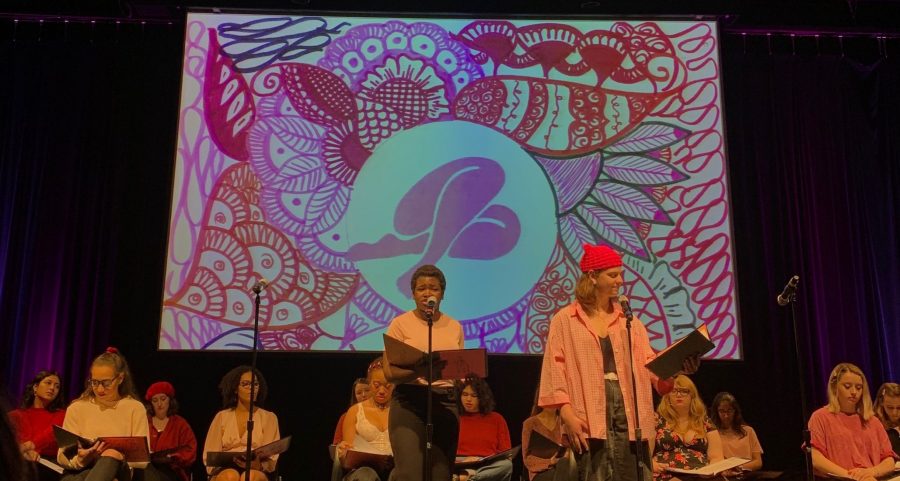On Feb. 13, MOSAIC: A Womxn of Color Initiative presented “The Vagina Monologues” in McManus Theatre. In what has become an annual tradition at Loyola, the three-day run of the show brought light to the most under-celebrated parts of a woman’s body.
In respect to the varying levels of comfortability in performers, both with the subject matter and being on stage, members of the cast were able to read over their monologue options before committing to one. Loyola’s production of “The Vagina Monologues” is dedicated to allowing anyone with an interest to partake— previous theatre experience isn’t necessary.
In the past, because of the disproportionate number of monologues to performers, monologues would be split into sections to accommodate as large of a cast as necessary. This year, however, director Caitlin Dwinnell ‘20 took a different approach to divvying up performance time.
“I put two women on each monologue and had them pass the monologue back and forth. I hoped that this would make it easier for the audience to connect to the character in each piece and create this air of relatability around each story,” said Dwinnell.
The presentation of each monologue varied, with some being delivered solo, and others following the new model created by Dwinnell. Fast facts about the vagina were also interjected between a few of the monologues by a first-time performer in this production, Kyra McDonnell ‘22.
McDonnell remembers not attending “The Vagina Monologues” during her first year at Loyola because she didn’t think anyone would accompany her. In 2020, McDonnell found herself on stage, pushing her limits in ways she hadn’t initially expected.
“I now have a desire to push my own boundaries further and enter into more open spaces like this one,” McDonnell said. “I was pleasantly surprised by the amount of support I received from people in my life and the positive impact I saw on my friends as it lead to more open dialogue regarding our own fears and subjects that have been considered taboo in the past.”
Like it was intended, McDonnell recommends joining the cast because of its inclusionary nature, from the casting to the production itself. McDonnell also noted the powerful people she was able to meet through this opportunity.
Eliza Snyder ‘23 was another new face in this year’s production. While she didn’t anticipate the show having a significant impact on her, Snyder walked away from the experience with a new sense of empowerment.
“I can confidently say that I have learned to better accept my body and love myself truly,” she said. “I feel as if I, along with the other people in the Monologues, feel more confident about who they are and it has empowered us all greatly.”
Frida Barrera Enciso ‘21, the Mosaic Leader of “The Vagina Monologues,” noted the importance of empowering women of color, especially first-year students transitioning into life at college. Though “The Vagina Monologues” has been performed at Loyola for the past four years, Barrera Enciso still finds positive surprises in the reception of this production.
“From the crowds we got all three nights, I did not realize that there were so many people and women of different backgrounds wanting this platform to discuss what it is like to have a vagina and what it is like to overtly discuss with others who understand and don’t understand,” she said.
Barrera Enciso is unaware of any pushback on this year’s production, and hopes this is a sign of the message becoming normalized on campus. Additionally, Barrera Enciso cited initiatives to come at Loyola that will hopefully maintain this energy of empowerment.
“I know of something in the works by the student-led movement, Loyola Rising, that focuses on the intersection of gun violence and black lives in multiple forms. The issues take root in the much bigger issue of racism in the United States,” she said. “I hope that “The Vagina Monologues” has prompted people to question the institution and the system we live in . I don’t think the political message that “The Vagina Monologues” presents is isolated from other social justice issues.”
Though traditionally taboo, “The Vagina Monologues” succeeds, year after year, in creating a safe space for women to take pride in their bodies and own their experiences. For both performers and viewers, the experience is one that is much different than what they are used to, but the positivity that follows is evident.
In the words of Snyder, “It is a fulfilling and satisfying process of artistic expression.”
Feature Image: Courtesy of Caitlin Dwinnell ’20 and Amanda Waggoner ’19.


















































































































